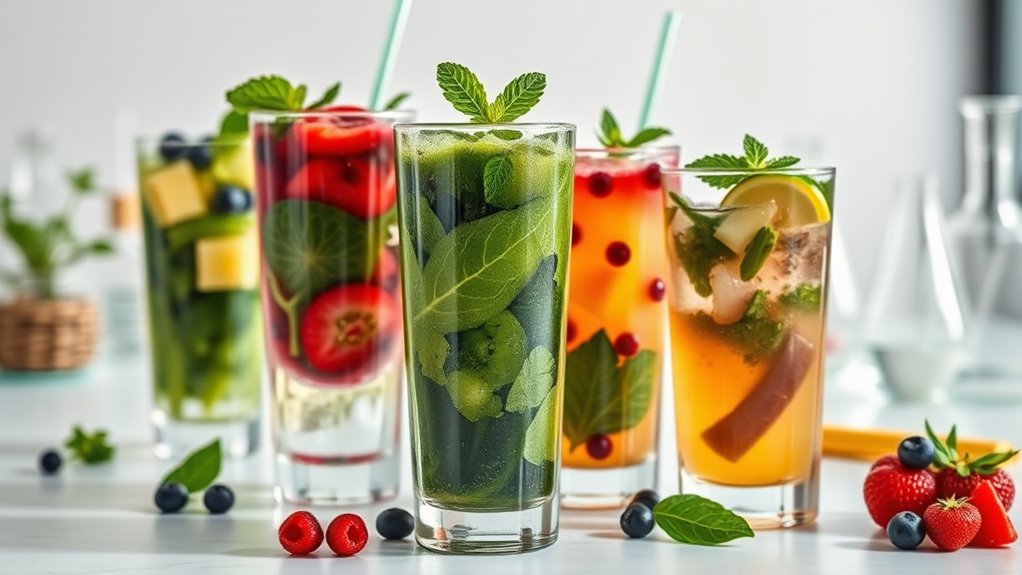Detox Drinks- Helpful Boost or Just Hype. Here’s What Science Says
You probably don’t know that your body’s liver and kidneys naturally handle detoxification, making many detox drinks less essential than claimed. While they can hydrate you and deliver antioxidants, overhyped weight loss promises rarely hold up. Explore why experts urge caution for safer health strategies.
Key Takeaways
- Detox drinks primarily aid hydration and nutrient intake, supporting natural body processes but not essential for toxin removal.
- Key ingredients like berries and green tea provide antioxidants that promote wellness, though they don’t enhance detoxification beyond normal functions.
- Scientific evidence from studies shows detox drinks offer minimal benefits for toxin elimination, mainly through hydration effects.
- Weight loss claims for detox drinks are largely hype, with no proven sustainable results beyond temporary water loss.
- Potential risks include dehydration and digestive issues, so experts recommend consulting professionals and focusing on balanced diets.
What Are Detox Drinks?
Detox drinks are beverages made from natural ingredients like fruits, vegetables, and herbs, designed to support your body’s toxin-elimination processes.
You might explore detox drinks for weight loss to enhance hydration and nutrient intake, as research indicates they can promote feelings of fullness and boost metabolism slightly.
Evidence from studies shows these drinks don’t cause rapid weight loss alone; instead, they’re most effective when you combine them with a calorie-controlled diet and exercise.
However, the body has its own natural detoxification systems, such as the liver and kidneys, which make these drinks less essential for true toxin removal.
Key Ingredients in Detox Beverages
You’ll often encounter fruits, vegetables, and herbs as the core elements in these beverages, which science backs for their roles in enhancing the body’s natural detoxification.
These components provide antioxidants, fiber, and essential nutrients that support everyday bodily processes like liver health and hydration.
- Berries deliver potent antioxidants that protect cells from damage, fostering overall wellness.
- Leafy greens supply dietary fiber, which aids in efficient waste removal through the digestive system.
- Herbs like ginger offer anti-inflammatory compounds, helping maintain gut balance and metabolic function.
Green tea is another popular ingredient in detox beverages, providing antioxidants that boost metabolism and overall health.
Scientific Evidence on Detox Efficacy
How do scientific studies assess the efficacy of detox beverages?
Researchers conduct randomized controlled trials and systematic reviews, measuring biomarkers like liver enzymes and toxin levels in your blood.
You’ll find that most evidence shows the human body naturally detoxifies through organs like the liver and kidneys, with detox drinks offering little additional benefit.
For instance, a 2015 review in the Journal of Human Nutrition and Dietetics analyzed multiple studies and concluded these beverages don’t enhance toxin elimination beyond hydration’s effects.
This keeps you informed on what’s truly supported by science. Moreover, staying hydrated can help support weight loss by curbing hunger and boosting metabolism, as seen in hydration-focused research.
Benefits Versus Hype in Weight Loss Claims
Why do companies often hype detox drinks as weight loss aids?
They promote them as quick fixes to boost sales, preying on your desire for easy results.
However, scientific studies reveal that these drinks rarely deliver sustainable weight loss, with effects mostly from temporary water loss rather than fat reduction.
- Science separates fact from hype: You’ll see that controlled trials show minimal impact on body fat, emphasizing diet and exercise instead.
- Examine claims critically: It’s essential to look for peer-reviewed evidence, as marketing often exaggerates short-term effects.
- Focus on real benefits: You can achieve lasting results through balanced nutrition, not relying solely on unproven supplements.
Similarly, fat-burning foods often fall short of their hype, as no single food provides a magic solution for weight loss.
Potential Health Risks of Detox Drinks
While detox drinks may seem appealing for their promised benefits, they can introduce serious health risks that warrant caution.
You might encounter dehydration from excessive diuretics, which studies link to electrolyte imbalances and fatigue.
Some ingredients, like laxatives or unregulated herbs, actively disrupt gut health, potentially causing nausea or diarrhea.
Research indicates that these drinks could strain your liver or kidneys, especially with prolonged use, as they interfere with natural detoxification processes.
Always consult a healthcare professional before trying them to avoid these evidence-based dangers.
Moreover, akin to the risks in rapid weight loss, detox drinks may also cause nutritional deficiencies that result in symptoms like tiredness and hair loss.
Real-World Experiences and Case Studies
Personal accounts and case studies provide a window into the real-world effects of detox drinks.
As you review these stories, you’ll see mixed outcomes: some report short-term energy boosts, while others describe minimal changes or side effects like nausea.
-
In one study, participants felt initial improvements in digestion, but these didn’t persist, highlighting the body’s natural processes.
-
Another case revealed that healthy individuals experienced no significant benefits, underscoring detox drinks’ limited impact beyond hydration.
-
Real-world data shows perceived gains often align with placebo effects, reminding you that individual responses vary widely based on evidence.
To achieve lasting results, individuals might benefit from practices like mindful eating, which align with sustainable weight management strategies.
Expert Advice for Sustainable Weight Management
As you incorporate detox drinks into your routine, experts emphasize sustainable diet strategies that focus on balanced, nutrient-dense meals to support long-term weight loss.
You’ll benefit from evidence-based approaches like prioritizing whole foods and controlled portions, which research links to better metabolic health.
Pairing these with effective exercise routines, such as consistent cardio and strength training, helps you build habits that promote enduring results.
Additionally, focusing on realistic goals can help you maintain steady progress by setting achievable milestones for your weight management journey.
Sustainable Diet Strategies
How can you build lasting weight management habits that go beyond quick fixes?
Start by adopting evidence-based diet strategies that emphasize balance and sustainability, drawing from studies on long-term health.
These approaches help you maintain weight without yo-yo effects, focusing on nutrient-rich foods and mindful eating.
- Prioritize whole foods: Research shows that diets rich in fruits, vegetables, and lean proteins reduce inflammation and support steady weight loss, fostering lifelong habits.
- Control portions mindfully: Clinical trials indicate that awareness of serving sizes prevents overeating, helping you tune into hunger cues for better self-regulation.
- Balance macronutrients: Evidence from nutritional science highlights that combining carbs, proteins, and fats optimizes metabolism, ensuring you feel satisfied and energized without extremes.
Effective Exercise Routines
Integrate effective exercise routines into your daily life to support sustainable weight management, drawing from expert-backed research that emphasizes consistency over intensity.
Studies show that combining aerobic activities, like brisk walking or cycling for 150 minutes weekly, with strength training twice a week builds muscle and boosts metabolism.
You’re more likely to maintain weight loss by starting small and progressing gradually, as per guidelines from the American College of Sports Medicine.
Track your progress to stay motivated, ensuring exercises align with your fitness level and preferences for long-term adherence and overall health benefits.





